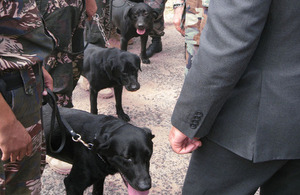Six UK trained military dogs in Lebanon
The military trained dogs play a vital role in detecting and preventing the emplacement of explosive devices in Lebanon.

The military trained dogs play a vital role in detecting and preventing the emplacement of explosive devices in Lebanon
As part of the UK’s military assistance programme to Lebanon, six UK trained explosive search dogs were handed to the Lebanese Armed Forces in the presence of the Army Commander General Jean Kahwaji, British Ambassador to Lebanon Tom Fletcher, Defence Attaché Lieutenant Colonel James Cushnir and senior Lebanese officers.
The highly trained dogs come from the Defence Animal Centre in England and carry out a range of tasks that include searching vehicles, buildings, and patrolling. These dogs play a vital role in detecting and preventing the emplacement of explosive devices which allows military and civilian population to carry out their daily business safely and with minimal disruptions. Explosive search dogs undergo intensive training and are taught to identify specific odours under the control of a trained handler with whom they will always work and forming a close bond.
British Ambassador Tom Fletcher said:
Lebanon is threatened by extremists who want to bring terror to the country. These dogs, in searching and finding explosives and weapons, will save Lebanese lives. They are just one part of our practical commitment to Lebanese stability, and to ensuring that the Lebanese Army has the training and equipment to match their courage.
British Dog trainer Staff Sergeant Matt Jones of the Royal Army Veterinary Corps said:
The continued Military Working Dog support to the LAF is vitally important on multiple fronts. Firstly the added dog capability continues to have profound success in providing security support to Lebanese Armed Forces and Lebanon as whole. Secondly the continuing relationship and training between the LAF and Royal Army Veterinary Corps that has been ongoing since 2008, has developed to such an extent that the LAF can now not only carry out missions to a very high level, but also increase their own capabilities to enhance Lebanese homeland security.